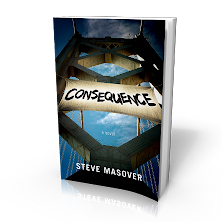Yesterday, my interview with Mary went live on the Eco-fiction site: Interview with Steve Masover, Author of Consequence. I can't say I have a favorite question in the interview -- they're all good ... but here's a question that I was especially glad to answer:
Mary: Your short fiction, prior to Consequence, has been published in various literary magazines and you have helped to write a screenplay. These works appear to contain messages that call for social or environmental justice. Has a reader ever responded with a changed viewpoint, and how do you think fiction is a good conduit for relaying such concerns?Visit the Eco-fiction site if you'd like to check out the full interview. And maybe look around a bit: there's plenty more to catch a reader's eye.
Steve: One of the most rewarding responses I’ve had to Consequence so far was from a student with whom I’ve been working on climate change issues at UC Berkeley. He told me that relationships between the activists portrayed in my novel helped him understand the importance of building friendship and support among people engaged in activist work: it’s not just about the issue, it’s also about the community. In the spring semester he wants to translate his insights into a more conscious, sustainable, and effective approach to environmental justice work on our campus. Another deeply appreciated response came from the wife of a fellow writer, who had the idea before reading Consequence that San Francisco activists could be written off as idealistic hippie burn-outs. I was moved–not to mention relieved–to learn that through my novel her attitude changed, having gained a more nuanced understanding of people who engage in progressive activism.
Non-fiction is key to laying out information and argument, which is certainly fundamental to pursuit of social and environmental justice, and to changing people’s views. But information is powerless against an impermeable mind and a closed heart. Honest fiction grounded in the real world is a way to convey information and perspective past barriers people erect against ideas they have dismissed, or ideas they are afraid to consider or feel. Empathy is the bridge past those barriers, and empathy is fiction’s strongest suit.
Related posts on One Finger Typing:
Paris, the Pleistocene, and finding the grit to grapple with climate change
Pre-apocalyptic fiction: staving off catastrophe
Activist fiction: it's about engagement, not about The Issue
Sticking your neck out





No comments:
Post a Comment
Note: Only a member of this blog may post a comment.